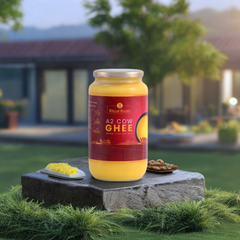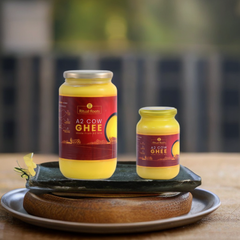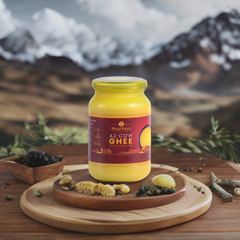
Cultured Ghee Benefits: How It Benefits A Dairy Powered Diet
The advantages of dairy products have been extensively explored and contested in nutrition. Dairy has long been a mainstay in many diets, contributing to everything from improved bone health to essential minerals. Finding adequate solutions, however, might be difficult for those who are lactose intolerant or looking for alternatives to standard dairy products, presenting cultured ghee, an adaptable and healthy substitute with a host of advantages for people on a diet high in dairy products. This article will examine the benefits of adding cultured ghee to your cooking skills.
Table of Contents
7 Cultured Ghee Benefits for A Dairy Powered Diet- Supports Digestibility and Nutrient Absorption
- Contains Lactose-Friendly Fats
- Rich in Conjugated Linoleic Acid
- Improved Gastrointestinal Health
- Natural Source of Butyric Acid
- Boosted Antioxidant Content
- Balanced Omega Fatty Acids
- Preparing Meals With the Finest Quality Cultured Ghee
- Bring Home Desi Ghee Goodness With Ritual Roots
- FAQs
7 Cultured Ghee Benefits for A Dairy Powered Diet
Supports Digestibility and Nutrient Absorption
The digestive benefits of cultured ghee are well known. Its production technique involves fermentation, which breaks down lactose and casein to make it simpler for those with sensitive stomachs or lactose intolerances to digest. Furthermore, gut health is improved by the presence of good bacteria, which encourages the best possible absorption of nutrients.
Contains Lactose-Friendly Fats
In contrast to regular butter with lactose and milk proteins, cultured ghee is clarified to remove these ingredients, leaving just pure butterfat. This means that people with dairy allergies or lactose intolerances can use it and still enjoy the rich flavor of butter without experiencing any side effects.
Rich in Conjugated Linoleic Acid (CLA)
Natural sources of CLA, a fatty acid with possible health advantages, can be found in cultured ghee. Based on available research, CLA may have anti-inflammatory, cardiovascular health-promoting, and weight-management effects. As such, it is a beneficial supplement to a well-rounded diet.
Improved Gastrointestinal Health
The presence of probiotics in cultured ghee contributes to a healthy gut microbiome. To support healthy digestion, the immune system, and general well-being, probiotics aid in the maintenance of a varied and balanced ecology of helpful bacteria in the digestive tract.
Natural Source of Butyric Acid
Cultured ghee contains butyric acid, a short-chain fatty acid essential for intestinal health. In addition to supporting immunological function and having anti-inflammatory qualities, it acts as the colon's lining cells' primary energy source. A healthy gut environment can be encouraged, and the risk of gastrointestinal diseases can be decreased by including cultured ghee in your diet.
Boosted Antioxidant Content
The fermentation process improves cultured ghee's antioxidant profile. By assisting the body in combating dangerous free radicals, antioxidants help lower inflammation and oxidative stress. By ingesting cultured ghee, you may provide your body with a substantial supply of antioxidants to promote general health and longevity.
Balanced Omega Fatty Acids
The proportion of omega-3 to omega-6 fatty acids, necessary fats essential for many physiological functions, is balanced in cultured ghee. Regulating inflammation, heart health, and brain function depends on maintaining an ideal omega fatty acid balance. Your diet can support a balanced fatty acid profile and enhance general well-being by including cultured ghee.
Preparing Meals With the Finest Quality Cultured Ghee
After discussing the many advantages of cultured ghee, let's talk about how to use this nutrient-dense ingredient in your cooking. The rich, nutty flavor of cultured ghee makes it an adaptable cooking fat that may enhance a variety of foods, from savory to sweet.
Using organic or grass-fed butter to make high-quality cultured ghee is crucial when preparing meals with it. Seek ghee with traditional techniques, such as slow simmering and straining, to maintain its nutrition and flavor. You can use cultured ghee as a spread or topping for frying, baking, and sautéing. Its rich taste adds depth to dishes, and its high smoke point makes it perfect for high-heat cooking techniques like stir-frying and deep-frying.
Try varying the flavor combinations and cooking methods of cultured ghee to realize its full potential. Cultured ghee adds a rich, complex flavor and nutritious boost to any meal, whether cooking traditional Indian cuisine or updating your favorite recipes.
Bring Home Desi Ghee Goodness With Ritual Roots
At Ritual Roots, we take great satisfaction in employing premium ingredients and time-honored procedures to make the highest quality cultured ghee. We use grass-fed butter from nearby dairy farms to make our handmade ghee, which guarantees excellent flavor and nutritious content.
Every batch of Ritual Roots cultured ghee undergoes a rigorous fermentation process that develops its natural probiotics and enriches it with good bacteria. The end product is a tasty and pure cooking fat that captures the essence of the long history of Indian cuisine. With Ritual Roots, enjoy the deliciousness of desi ghee and take your cooking to new levels. Our cultured ghee will please your palate and nourish your body whether you use it for baking bread, sautéing veggies, or spreading it over toast.
FAQ’s
Q: Can cultured ghee be used as a substitute for butter in cooking?
Ans: Yes, cultured ghee can be used as a substitute for butter in cooking. Its high smoke point and rich flavor make it ideal for various culinary applications, from sautéing to baking.
Q: How should cultured ghee be stored to maintain its taste?
Ans: Cultured ghee should be stored in a cool, dry place away from direct sunlight. It does not require refrigeration and can be kept at room temperature for extended periods without spoiling.
Q: Can cultured ghee be part of a vegan or plant-based diet?
Ans: No, cultured ghee is derived from dairy butter and is unsuitable for a vegan or plant-based diet. However, individuals who consume dairy products can incorporate cultured ghee into their diet as a nutritious cooking fat.
Q: Can cultured ghee be used in coffee or beverages?
Ans: Cultured ghee can be used in coffee or beverages as a creamy and flavorful addition. It adds richness to hot drinks and can be blended into smoothies for nutritional benefits.
Q: What considerations should be followed when consuming cultured ghee?
Ans: When consuming cultured ghee, it's essential to be mindful of portion sizes, as it is a concentrated source of calories and fat. Additionally, individuals with dairy allergies or sensitivities should exercise caution and consult a healthcare professional before incorporating cultured ghee into their diet.
-

A2 Cow Pure Ghee , Desi Gir Cow (1 KG)
Rs. 2,470.00 -

A2 Cow Pure Ghee , Desi Gir Cow (1.5 KG)
Rs. 3,700.00 -

A2 Cow Pure Ghee , Desi Gir Cow (500gm)
Rs. 1,350.00


